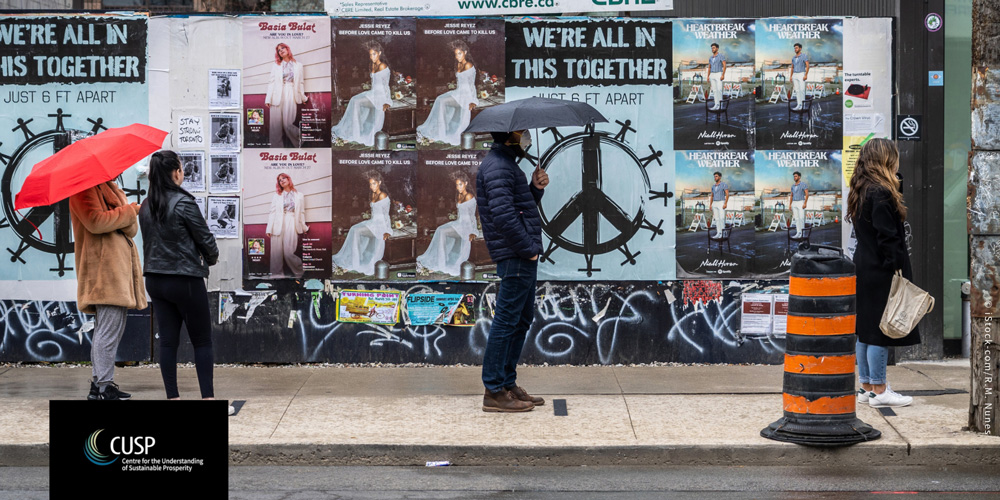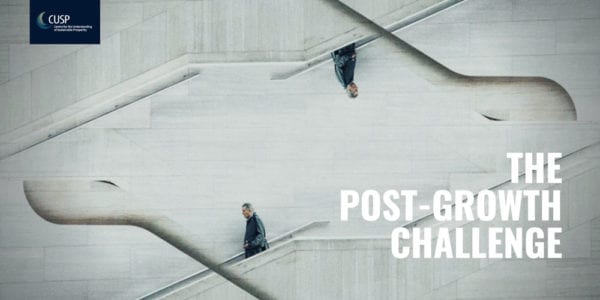Building Forward Better | CUSP research feeding into ambitious Canadian Senate White Paper
Pioneering post-growth research by Tim Jackson and Peter Victor—showing that improved environmental and social outcomes are possible even as the growth rate declines to zero—has informed work on the recently published White Paper from the Office of Canadian Senator Rosa Galvez on ‘Building forward Better’, outlining key recommendations for a clean and just recovery from the Covid-19 Pandemic, to “help shift our concept of growth to be centered around sustainable prosperity.”
November 2020

Executive Summary
A crisis is sweeping the globe and unless we heed the advice of scientists and take action, millions of people will die and billions more are at risk. Sound familiar? COVID-19, like climate change, threatens our economic, social, and physical well-being. The advent of this deadly virus, however, should be understood as a symptom or co-hazard of environmental degradation and climate change rather than an extraneous event. Human-caused environmental degradation is increasing the likelihood and severity of pandemics.
Along with the tragic impact the pandemic has had on our health, it has exposed the vulnerabilities of a broken system. The lockdown conditions have taken a disproportionate toll on lower income individuals, the elderly, and groups who already bear a degree of structural oppression: women, Indigenous Peoples, and racialised individuals. Further, the pandemic has revealed a system wherein we exploit the finite natural resources of our planet with the illogical expectation of infinite growth and governments subsidise environmentally destructive behaviour through support to polluting industries and corporation. Unbridled economic growth is the root cause of ecological destabilisation and flatlining living standards for many.
As stimulus begins to flow, we must reflect on the ultimate goal and the most efficient way to achieve it. A clean and just recovery is one that puts people before profit and focuses on furthering and eventually achieving human and ecosystem wellbeing. Such a goal implies the development of principles and tools that will not only ensure that the costs and benefits of the recovery will be distributed equitably, but also help shift our concept of growth to be centered around sustainable prosperity–after all, the economy must serve society, not the other way around.
Traditional stimulus measures have a poor governance and transparency track record. Looking forward, we must worry about reinforcing a status quo of over investment into soon-to-be stranded assets, unnecessary exposure to financial risk, and increasing inequality. Meanwhile, a mix of policies that prioritise human and ecosystem wellbeing in an attempt to build forward better does exactly the opposite through the synergistic production of co-benefits. All policies must be scrutinised through gender, social justice, and climate lenses which must be rapidly developed and implemented as well as carry strict measures for accountability, transparency, and conditionality.
Canadians have demonstrated, with the wave of environmental protests of the last few years through the country culminating in September 2019, that they want the transition to a low-carbon economy to accelerate and be completed. In fact, due to inaction, which has hampered this transition for the past three decades, we now need a rapid and far-reaching transformation. Recent polls show most Canadians view the COVID-19 pandemic as an opportunity to address more than one crisis with the same recovery. There is strong support for taxing extreme wealth, investment in sustainable industries, and reinforcing our commitment to fight climate change through both mitigation and adaptation. The clean and just recovery that Canadians are demanding should be seen as an investment, with a high potential for returns, in our collective future well-being rather than simply an outflow of public funds.
The White Paper is available in English and French on the Senator Rosa Galvez’ website.
About Rosa Galvez
Rosa Galvez, originally from Peru, is an environmental engineer, professor, pollution expert, and independent senator from the province of Quebec since 2016. In the first session of the forty-third parliament, she was a member of the Senate Standing Committee on National Finance which provided oversight for the federal government’s emergency COVID-19 response and attended all Senate sittings to adopt emergency measures since the beginning of the crisis. She recently organised a webinar series on a clean and fair recovery for parliamentarians and government decision-makers to which Peter Victor also contributed, alongside Joseph Stiglitz and Cameron Hepburn.



